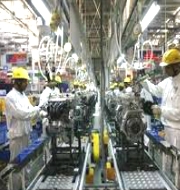Government to release new industrial policy
The Department of Industrial Policy and Promotion (DIPP) under the Commerce and Industry Ministry is going to release a new industrial policy by October 2017. It is expected to replace National Manufacturing Policy (NMP) released in 2011
The new policy aims at making India a manufacturing hub by promoting ‘Make in India’ with focus on encouraging Indian branded products with higher value addition. It will also review the existing foreign direct investment (FDI) policy regime to facilitate greater technology transfer.
Features of New policy
The proposed policy will aim to set clear vision for role of industry and industrial growth in growth and development of economy. It will be comprehensive, actionable, outcome-oriented policy that will enable industry to deliver a larger role in economy and fulfil its role as engine of growth and add more value and jobs.
DIPP has adopted consultative approach for formulating industrial policy by setting up six thematic focus groups. These six thematic areas are Manufacturing and MSME, Technology and Innovation, Infrastructure, Investment, Trade and Fiscal Policy, Ease of Doing Business and Skills and Employability for Future.
The policy will aim to attract $100 billion of FDI in a year, up from $60 billion in 2016-17. It will also aim at retaining investments and accessing technology. It will also ensure that it facilitates greater technology transfer, leverages strategic linkages and innovation.
It will incorporate measures to facilitate use of smart technologies such as the internet of things (IoT), artificial intelligence (AI) and robotics for advanced manufacturing. A task force constituted on artificial intelligence under the chairmanship of V. Kamakoti will also provide inputs for the policy
The policy will aim to harness existing strengths in sectors like automobiles and auto-components, electronics, new and renewable energy, banking, software and tourism, and create globally scaled-up and commercially viable sectors such as waste management, medical devices, renewable energy, green technologies, financial services to achieve competitiveness.
The policy will also push for reforms to enhance labour market flexibility with an aim for higher job creation in the formal sector and performance linked tax incentives. It will also take into consideration changing economic and business cycles of world and Indian economy, geopolitical trends and broad policy directions in country.
Month: Current Affairs - August, 2017


